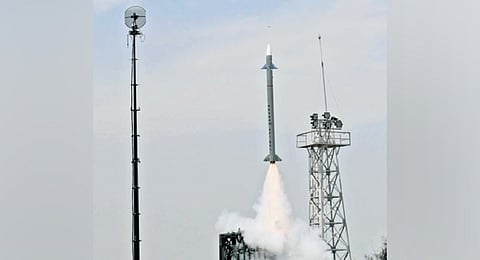

BHUBANESWAR: India conducted a series of user trials of medium-range surface-to-air missile (MRSAM) from a defence facility off Odisha coast on Friday.
Defence sources said at least four rounds of the Army variant of MRSAM were tested against four separate fast moving aerial targets on Thursday and Friday, demonstrating the advanced system’s high killing efficiency.
The live firing trials were conducted by the Eastern and Southern commands of the Army, under the guidance of the DRDO from the launching complex - IV of the integrated test range (ITR) at Abdul Kalam Island.
“Four operational flight trials were carried out against high-speed aerial targets. The missiles achieved direct hits by intercepting targets at long and short ranges, both at high and low altitudes, proving the operational capability of the weapon system,” the Defence ministry said in a statement.
Jointly developed by DRDO and Israel Aerospace Industries (IAI), MRSAM army weapon system comprises multi-function radar, command post, mobile launcher system and other vehicles.
“These trials have proven the operational capability of both the army commands and paved the way for operationalisation of weapon systems in the two regiments,” the MoD said. The network-centric and most advanced sleek missile has a strike range up to 100 km and flies at supersonic speed. The 4.5-metre long quick reaction missile weighs around 2.7 tonne and can carry a payload of 60 kg.
Travelling at a speed of Mach 2, it can achieve high degrees of manoeuvrability at the terminal phase. Defence sources said the missile can destroy airborne threats, including subsonic and supersonic cruise missiles, anti tank systems, rockets and jets. It is one of the few missiles, developed and deployed within five years.
Secretary of Department of Defence R&D and DRDO chairman Samir V Kamat termed the mission as a major milestone for building operational capability of the Indian Army. Defence Minister Rajnath Singh has congratulated DRDO, Army and the industries for the successful flight-tests.